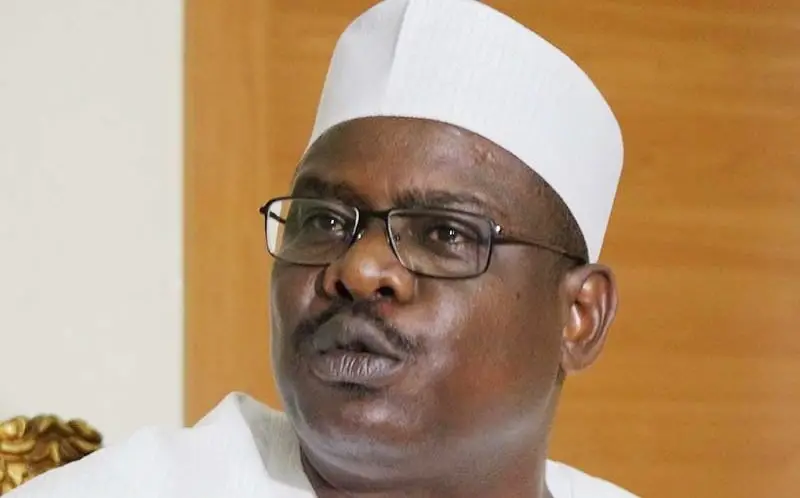News
Fight-to-finish: Israel Deploys New Military AI In Gaza War

Israel’s army has deployed some AI-enabled military technology in combat for the first time in Gaza, raising fears about the use of autonomous weapons in modern warfare.
The army has hinted at what the new tech is being used for, with spokesman Daniel Hagari saying last month that Israel’s forces were operating “above and underground simultaneously”.
A senior defence official told AFP the tech was destroying enemy drones and mapping Hamas’s vast tunnel network in Gaza.
READ ALSO: UPDATED: EFCC Declares Emefiele’s Wife, Three Others Wanted
New defence technologies including artificial intelligence-powered gunsights and robotic drones form a bright spot in an otherwise dire period for Israel’s tech industry.
The sector accounted for 18 percent of GDP in 2022, but the war in Gaza has wreaked havoc with an estimated eight percent of its workforce called up to fight.
“In general the war in Gaza presents threats, but also opportunities to test emerging technologies in the field,” said Avi Hasson, chief executive of Startup Nation Central, an Israeli tech incubator.
“Both on the battlefield and in the hospitals there are technologies that have been used in this war that have not been used in the past.”
READ ALSO: AFCON: Tinubu To Attend Final In Cote D’Ivoire
But the rising civilian death toll shows that much greater oversight is needed over the use of new forms of defence tech, Mary Wareham, an arms expert at Human Rights Watch, told AFP.
“Now we’re facing the worst possible situation of death and suffering that we’re seeing today –- some of that is being brought about by the new tech,” she said.
More than 150 countries in December backed a UN resolution identifying “serious challenges and concerns” in new military tech, including “artificial intelligence and autonomy in weapons systems.”
– ‘Angry Birds’ –
Hamas on October 7 launched an unprecedented attack on Israel, resulting in the deaths of about 1,160 people in Israel, mostly civilians, according to an AFP tally based on official figures.
Hamas also seized around 250 hostages, and Israel says some 132 remain in Gaza including at least 29 believed to have been killed.
READ ALSO: Thai Police Arrest Two Nigerians, Thai Woman For Romance Scam
Israel’s military response has killed nearly 28,000 people in Gaza, mostly women and children, according to the Hamas-ruled territory’s health ministry.
Like many other modern conflicts, the war has been shaped by a proliferation of inexpensive unmanned aerial vehicles (UAVs), also known as drones, which have made attacks from the air easier and cheaper.
Hamas used them to drop explosives on October 7, while Israel has turned to new tech to shoot them down.
In a first, the army has used an AI-enabled optic sight, made by Israeli startup Smart Shooter, which is attached to weapons such as rifles and machine guns.
“It helps our soldiers to intercept drones because Hamas uses a lot of drones,” said the senior defence official.
READ ALSO: Ondo Doctors To Embark On Strike Over Poor Welfare Package Doctor
“It makes every regular soldier — even a blind soldier — a sniper.”
Another system to neutralise drones involves deploying a friendly drone with a net that it can throw around the enemy craft to neutralise it.
“It’s drone versus drone — we call it Angry Birds,” the official said.
– Hamas tunnels –
A pillar of Prime Minister Benjamin Netanyahu’s vow to “destroy” Hamas is quickly mapping the underground tunnel network where Israel says the group’s fighters are hiding and holding hostages.
The network is so vast that the army has dubbed it the “Gaza Metro” and a recent study by US military academy West Point said there were 1,300 tunnels stretching over 500 kilometres (310 miles).
READ ALSO: Gaza Population In ‘Grave Peril’, Says WHO
To map the tunnels the army has turned to drones that use AI to learn to detect humans and can operate underground, including one made by Israel startup Robotican that encases a drone inside a robotic case.
It is being used in Gaza “to enter into tunnels and to see as far as the communication lets you,” the senior Israeli defence official said.
Before the war the technology did not allow drones to operate underground because of issues sending images to the surface, the official added.
The conflict has raised human rights concerns but also cemented Israel’s status as a world-leading manufacturer of cutting-edge defence systems.
The Wall Street Journal reported last month that the United States — Israel’s main international ally and provider of billions of dollars each year in military aid — was training its own soldiers to shoot down drones using Smart Shooter’s optic sights.
In late January, three US soldiers were killed in a drone attack on a base in Jordan.
News
New Tax Laws: Suspend January 2026 Implementation — Senator Ndume Tells Tinubu

Former Senate Leader, Ali Ndume has appealed to President Bola Ahmed Tinubu to suspend the January 1, 2026, implementation of the country’s new tax laws amid growing controversy.
The federal lawmaker made the appeal in a statement he issued on Wednesday in Abuja.
This comes as the Nigerian Bar Association demanded the suspension of the implementation.
Recall that a member of the House of Representatives, Abdussamad Dasuki, had last week called the Parliament’s attention to alleged alteration to the tax laws.
READ ALSO:FIRS Confirms NIN As Tax ID
Chairman of the Presidential Fiscal Policy and Tax Reforms Committee, Taiwo Oyedele, in an interview on Arise Television on Wednesday, called for calm over claims of alterations in tax laws and urged Nigerians to allow lawmakers to complete their investigation before drawing conclusions.
Speaking on the ongoing controversy about the tax laws, Ndume noted that proceeding with the implementation without getting to the root of the alleged forgery will create a legitimacy challenge for the tax laws.
His statement read, “With the controversy surrounding it, the President should constitute a team to verify the veracity of the claim and act accordingly.
“As the responsive leader that he has always been, he should look at it to find out if the copy that was signed and the claim of alterations are genuine so that he will do the needful to bring the controversy to rest.
READ ALSO:US Threatens To Sanction Countries That Vote For Shipping Carbon Tax
“If not, the controversy will continue.” That is to say, the tax law will not be implemented, because you can’t build on nothing.
“So, Mr. President should suspend the implementation until the issues are resolved because so many civil society organizations, the Arewa Community, and the Nigerian Bar Association are saying that he should withdraw the tax law and investigate the allegation of forgery.”
“Therefore, Mr President should get to the root of the allegation of forgery. The small committee that will be set up should look into it while the House of Representatives does its own.”
News
Tambuwal Engages Security Agencies As US Airstrikes Hit Own LG In Sokoto

Senator Aminu Waziri Tambuwal, representing Sokoto South, has called on residents of Sokoto State to remain calm following reports of United States airstrikes targeting ISIS-linked terrorists on Christmas Day.
In a statement posted on his personal X account, the former Sokoto State governor said he was aware of reports concerning the airstrikes, which marked a direct US military action in Nigeria based on intelligence about ISWAP threats, and urged citizens to remain law-abiding while authorities clarify the situation.
“I have noted the reports concerning an airstrike carried out as part of ongoing counterterrorism efforts through cooperation between the federal government of Nigeria and the United States,” Tambuwal said. “I urge our communities to remain calm and law abiding as relevant authorities clarify the circumstances surrounding the operation.”
READ ALSO:US Dept Of War Shares Video Of Air Strikes In Nigeria
Tambuwal assured constituents that he was engaging with relevant security agencies to obtain full details of the operation and to ensure that necessary things were in place to protect civilians.
“I wish to assure the people of Sokoto South that I am in active talks with relevant security authorities to obtain full details and ensure that all necessary safeguards are upheld,” he added.
The senator emphasised that counterterrorism operations were aimed strictly at criminal and terrorist elements threatening public safety, not innocent civilians who are often victims of insecurity. He stressed that the protection of civilian lives must remain central to all legitimate security actions.
He further called on community leaders, traditional institutions and residents to work closely with security agencies by sharing credible intelligence and resisting misinformation capable of causing fear or heightening tension.
News
Rep Moore Confirms 12 Tomahawk Missiles Launched In Sokoto

No fewer than 12 Tomahawk missiles were on December 25 launched against terrorists in Sokoto State by the United States military.
Rep Riley M. Moore, the lawmaker representing Virginia’s Second District in the Congress, confirmed this in an interview with Fox News.
The US military operated in Sokoto State on Christmas night, bombing terrorists killing innocent people in parts of Nigeria.
READ ALSO:Trump’s Airstrikes: Halt Military Cooperation With US Immediately – Sheikh Gumi Tells Tinubu Govt
Some security analysts claimed on Friday that the operation was unsuccessful and had no significant impacts on the targeted terrorists.
According to them, the airstrikes landed in safe places including farms where there was no history of terrorists’ hideout.
But details began to emerge on Friday night, indicating that several terrorists were killed during the joint operations between the US army and it’s Nigerian counterpart.
READ ALSO:Nigerian Ringleader Of Nationwide Bank Fraud, Money Laundering Jailed In US, Says FBI
Moore said: “This year, thanks to President Trump, Radical Islamic Terrorists were on the receiving end of 12 Tomahawk missiles as a present.
“The successful strikes on ISIS, in coordination with the Nigerian government, is just the first step to secure the country and end the slaughter of our brothers and sisters in Christ”.
DAILY POST reports that residents of Sokoto State have been panicking since the US military operation.

 News5 days ago
News5 days agoPHOTOS: New Era In Furupagha-Ebijaw As Okpururu 1 Receives Staff Of Office

 News4 days ago
News4 days agoUBTH CMD Marks 120 Days In Office, Expresses Commitment To Providing Conducive Working Environment

 News5 days ago
News5 days agoOPINION: Gumi And His Terrorists

 News4 days ago
News4 days agoFIRS Confirms NIN As Tax ID

 News5 days ago
News5 days agoFG Declares Public Holidays For Christmas, New Year Celebrations

 News5 days ago
News5 days agoOPINION: Christmas And A Motherless Child

 Metro4 days ago
Metro4 days agoFintiri Pardons Man Sentenced To Death For ‘Killing Herdsman In Self-defence’, Others

 News3 days ago
News3 days agoJUST IN: Kano Lawmaker, Sarki Aliyu Daneji, Dies Hours After Colleague’s Passing

 News4 days ago
News4 days agoOPINION: My Man Of The Season

 News4 days ago
News4 days agoKWAM 1 Withdraws From Awujale Race, Ends Court Challenge




























